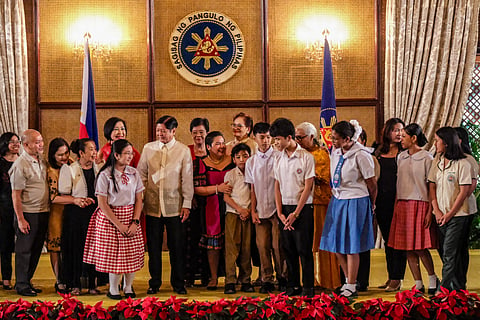
- NEWS
- the EDIT
- COMMENTARY
- BUSINESS
- LIFE
- SHOW
- ACTION
- GLOBAL GOALS
- SNAPS
- DYARYO TIRADA
- MORE

President Ferdinand R. Marcos Jr. on Monday signed into law a measure amending the Rice Tariffication Law (RTL) to improve the country’s rice industry and ensure a more stable food supply.
In inking Republic Act (RA) 12078, or the Agricultural Tariffication Act, Marcos said the government aims to ensure that farmers will have steady “access to resources they need to succeed in rice farming.”
“This will enable us to do much more for our farmers, ensuring that they have the resources they need to succeed and to make the rice industry even more competitive,” Marcos said in his speech during a ceremony at Malacañang.
The new law will extend the implementation of the Rice Competitiveness Enhancement Fund (RCEF) until 2031 and increase its annual funding from P10 billion to P30 billion.
Marcos noted that the RCEF allowed the government to invest in high-quality seeds, mechanization, and training for farmers, ensuring that they “are equipped with the right skills and tools to increase their productivity.”
“With the expiration of the original six-year plan for the RCEF fast approaching, it became clear that we needed to extend and strengthen the program,” he said.
Under the new law, the additional funding will support priority projects such as training and extension services, financial assistance to rice farmers cultivating up to two hectares of land, expand rice credit assistance, composting facilities for biodegradable wastes, pest and disease management, soil health improvement, farming support programs on contract farming, and the establishment of solar-powered irrigation systems.
DA powers
The measure also seeks to enhance the seed procurement and mechanization programs, which aim to provide farmers greater access to high-quality seeds to boost their yields.
Marcos emphasized that the new law will strengthen the regulatory functions of the Department of Agriculture (DA), which will strictly oversee the rice industry’s systems and policies to ensure that rice reaching the market complies with quality standards and regulations.
“In cases of sudden rice shortages or price hikes, the DA will be empowered to take the necessary actions to stabilize the market,” he said. “This will help ensure that the price of rice remains affordable and accessible to every Filipino.”
According to Marcos, the new law also empowers the Bureau of Plant Industry (BPI) to “inspect rice warehouses and manage a national database to track grain storage, safeguarding our food supply and ensuring its safety for the public.”
He said the amended RTL empowers farmers “to thrive and help our country secure a stable food supply.”
“By increasing investments in agriculture, providing more resources, and creating a more competitive rice industry, we are laying the groundwork for a stronger, more self-sufficient Philippines,” Marcos said.
Machinery, equipment, too
Senate President Francis “Chiz” Escudero said the Agricultural Tariffication Act will provide greater support for Filipino farmers through the provision of farm machinery and equipment, free distribution of high-quality inbred certified seeds, and other interventions.
Under the law, the country’s buffer rice stock will be maintained at 30 days to sustain disaster relief programs during natural or man-made calamities and to address food security emergencies.
Escudero noted that the inspection and monitoring of warehouses and agricultural facilities by the DA, through the BPI, will be strengthened under the new law.
He added that the new law seeks to stabilize the supply of rice in the market and maintain quality control of the rice being sold to consumers.
Smuggling, hoarding
“We want to avoid a situation where the price of rice shoots up unnecessarily due to smuggling or hoarding. This has long been a problem in the country that should be addressed immediately,” he said.
The new law empowers the Secretary of Agriculture to better respond to declarations of rice shortages or extraordinary increases in price.
During periods of extraordinary price increases, the Secretary is authorized to designate importing entities — excluding the National Food Authority — to import rice to augment the supply and stabilize prices.
Senate Bill 2779, which was the basis for the new law, was sponsored by Senator Cynthia Villar as chair of the Committee on Agriculture, Food, and Agrarian Reform. It was a consolidation of bills filed by Senators Imee Marcos, Robin Padilla and Villar.
